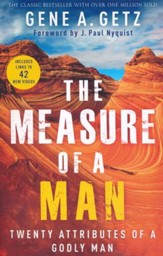
Quotes by Gene Getz
Without the message of the Scriptures we would have nothing with which to encourage one another. We would have no purpose for meeting together. Our knowledge of God would be so limited we would have no rational object for our faith, no doctrine on which to build our hope, and no way of even knowing the meaning of genuine love.
Encouraging One Another, Cook Communication Ministries, 1985, p. 17-18. Reprinted with permission. May not be further reproduced. All rights reserved.
A temperate man doesn’t lose his physical, psychological and spiritual orientation. He is stable and steadfast, and his thinking is clear… [He] doesn’t go to extremes… [He] doesn’t go on emotional tangents. He has a sense of inner peace and security, no matter what is happening in life generally. This doesn’t mean he never has periods of anxiety, but overall he has a sense of stability. In the words of James, he is not a “double-minded man” (Jas. 1:8).
The Measure of a Man by Gene Getz, Copyright 1995, p. 55-56, Gospel Light/Regal Books, Ventura, CA 93003. Used by Permission.
We should remember that it’s always very important to evaluate impressions, ideas, and experiences in the light of the revealed Word of God. If we do not, we could make some serious errors in judgment and behavior. I’ve known some Christians who have had certain “religious experiences” which contradicted the Bible. Yet they chose to follow their religious experiences rather than the Word of God. The results were spiritually disastrous.
Encouraging One Another, Cook Communication Ministries, 1985, p. 29. Reprinted with permission. May not be further reproduced. All rights reserved.
The Gospels tell us what Jesus said and did during His earthly ministry; the Book of Acts reveals the coming of the Holy Spirit, the founding of the church, and the spread of Christianity. The epistles instruct us in sound doctrine – what to believe and how to live in the light of God’s mercy and grace. The Book of Revelation reveals “what is yet to come.”
Encouraging One Another, Cook Communication Ministries, 1985, p. 25. Reprinted with permission. May not be further reproduced. All rights reserved.
In our culture, I personally believe this admonition should mean that we give a minimum of 10% of our gross income. If at all possible, this should be a starting point. If it is not possible, it should be our goal – one that we should ask God to help us reach as soon as possible.
Becoming a Spiritually Mature Leader, Quoted in: Leaders on Leadership, ed. George Barna, 1997, Gospel Light/Regal Books, Ventura, CA 93003, Used by Permission, p. 102.
One of God’s primary means of encouraging Christians everywhere is with truth – truth revealed by the Holy Spirit. The repository of that truth is the Bible. That is what Paul wrote, “For everything that was written in the past was written to teach us, so that through endurance and the encouragement of the Scriptures we might have hope” (Rom. 15:4).
Encouraging One Another, Cook Communication Ministries, 1985, p. 26. Reprinted with permission. May not be further reproduced. All rights reserved.
Though true Christianity uniquely involves a personal relationship with Jesus Christ, it is also a corporate experience…Christians cannot grow spiritually as they ought to in isolation from one another.
Anger becomes sinful when it:
1. Results in “quick-tempered” behavior.
2. Hurts people physically.
3. Persists and results in bitterness.
4. Prolongs communications.
5. Hurts people emotionally and spiritually.
6. Becomes vengeful.
The Measure of a Man by Gene Getz, Copyright 1995, Adapted from p. 140-144, Gospel Light/Regal Books, Ventura, CA 93003. Used by Permission. Get this book!
Drinking alcohol beverages is outside of God’s will when we:
1. Overdrink or overindulge (1 Cor. 6:9-11).
2. Become addicted (1 Cor. 6:12).
3. Cause others to sin (Rom. 14:21).
4. Hurt ourselves or others (1 Cor. 6:20).
The Measure of a Man by Gene Getz, Copyright 1995, Adapted from p. 115-118, Gospel Light/Regal Books, Ventura, CA 93003. Used by Permission. Get this book!
Biblically speaking, there are no exceptions or exemptions for a father when it comes to overseeing family responsibilities. This does not mean, of course, that he is to do all the work, but ultimately he is responsible to make sure that all members of his family are loved, cared for, encouraged, and taught God’s truth. In turn, he is responsible for each person to function properly (according to age levels) within this God-ordained social unit.
Elders and Leaders, Moody, 2003, p. 265. Get this book!
Paul presented this "older woman (teaching) younger woman" model as one of the greatest teaching opportunities mature Christian women can have in the church. They carefully share wisdom out of their years of experience, something even mature men have no capacity to do. Furthermore, these mature women can do what men should not do in a personal setting – to communicate with women regarding very intimate matters. It’s obvious Timothy faced this challenge in Ephesus when Paul exhorted him – particularly as a young single man – to "treat…older women as mothers, and younger woman as sisters, with absolute purity" (1 Ti. 5:1-2).
Elders and Leaders, Moody, 2003, p. 118. Get this book!
A Christian man who loves himself is a victim of the “I,” “me” and “mine” syndrome. He is self-involved and self-orientated. His needs are central in all that he does. He is driven by self-interest. In short, he is selfish.
The Measure of a Man by Gene Getz, Copyright 1995, p. 226, Gospel Light/Regal Books, Ventura, CA 93003. Used by Permission. Get this book!
A leader should be able to communicate in a nonargumentative, nondefensive and nonthreatening way – demonstrating gentleness, patience and teachability without compromising the message of the Word of God.
Leaders on Leadership, 1997, p. 92, Gospel Light/Regal Books, Ventura, CA 93003, Used by Permission.
What are my motives in relationship to what I wear? Am I merely attracting attention to myself or to the Lord Jesus Christ who lives within me? Remember: You can dress elaborately to attract attention to yourself, or you can be shabby, unkempt or unclean to attract attention to yourself. Both lead to a lack of respectability.
The Measure of a Man by Gene Getz, Copyright 1995, p. 81, Gospel Light/Regal Books, Ventura, CA 93003. Used by Permission. Get this book!
Money can quickly become an end in itself rather than a means to godly ends.
The Measure of a Man by Gene Getz, Copyright 1995, p. 198, Gospel Light/Regal Books, Ventura, CA 93003. Used by Permission. Get this book!
Accountability Questions:
1. How often did you meet with God this week?
2. What has God been saying to you through His Word this week?
3. What sins in your personal or business life did you experience this week that need confession?
4. Are you giving to the Lord’s work regularly and proportionately as God has blessed you? What percentage did you give last month?
5. What movies did you see this past week? Do you feel good about viewing these movies? What about the Internet? Would you be able to tell your fellow Christians in your church what you have seen without being embarrassed?
6. How did you influence your marriage and family this week? How positively? How negatively? What could you do to improve?
7. Did you pray for me/us this week?
8. What challenges or struggles are weighing on your mind?
9. What lives did you influence for Christ this week?
10. Did you just lie to me?
Elders and Leaders, Moody, 2003, p. 274-275. Get this book!
“Fixing our eyes on Jesus” is perhaps the most important lesson in this athletic metaphor. Any runner in the Greek stadium who took his eyes off the goal and either looked at the crowds, or his competitors, would lose valuable time and concentration. So it is in the Christian life. When we get our eyes off the Lord, and onto others, we are in danger of getting sidetracked spiritually.
The Measure of a Man by Gene Getz, Copyright 1995, p. 273, Gospel Light/Regal Books, Ventura, CA 93003. Used by Permission. Get this book!
Someone has said that more is learned from what is “caught” that “taught”… Though it is certainly important to communicate God’s Word didactically, it’s what people see in our lives that gives weight to our words. That is why the qualifications for elders are so important. If we are to “teach the Word of God” effectively, we must simultaneously “live the Word of God.”
Elders and Leaders, Moody, 2003, p. 267. Get this book!
Paul and Peter listed and described specific “functions” for elders/overseers… God’s people in “every tribe and language and people and nation” (Rev. 5:9) and at any period in history need oversight, teaching, admonishing, and prayer. However, the specific “functions” for the deacons are never spelled out in detail – except the one that is inherent in their title – to “serve” (diakoneo). The generic “function” must be fleshed out in various ways from place to place at different points in time and history…as they assist the elders/overseers in carrying out their shepherding responsibilities.
Elders and Leaders, Moody, 2003, p. 103, 102. Get this book!
Statistics reveal that most Christians in America do not include God in their budgets… Sadly, God often gets what is leftover, if anything.
The Measure of a Man by Gene Getz, Copyright 1995, p. 194-195, Gospel Light/Regal Books, Ventura, CA 93003. Used by Permission. Get this book!
The extent to which I love God and reflect that love by doing His will revealed in the Word of God is also the degree to which I “love what is good” [see Rom. 12:9]. Consequently, the real questions I must face are: Do I really love God? How much do I really love God?
The Measure of a Man by Gene Getz, Copyright 1995, p. 230, Gospel Light/Regal Books, Ventura, CA 93003. Used by Permission. Get this book!
God has not given us one set of leadership principles for marriage relationships, another set for biological family relationships, and yet another for relationships in the larger (church) family. Though each sphere of influence broadens in terms of function and responsibility, the basic leadership principles are the same. A husband is to be a servant-leader to his wife, a father is to be a servant-leader in his family, and elders/overseers are to be servant-leaders in the family of God.
Elders and Leaders, Moody, 2003, p. 126. Get this book!
In God’s divine design, every “biological family” when converted to Christ becomes the “church in miniature”… And as these families mature and reflect the fullness of Christ, they become the strong building blocks of the church. In this sense, mature families automatically create mature churches.
Elders and Leaders, Moody, 2003, p. 126. Get this book!



